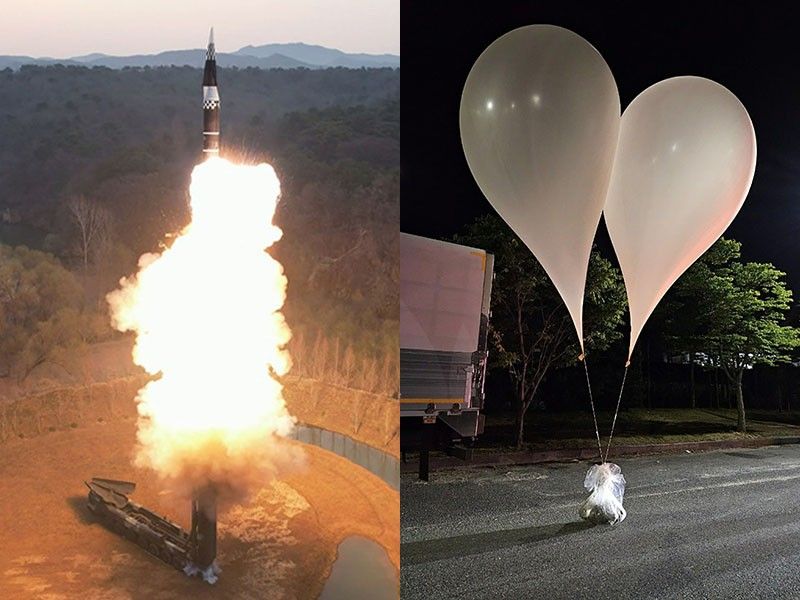Satellite, 'poopaganda', missiles: What's North Korea up to?

SEOUL, South Korea — A failed satellite launch, floating hundreds of trash-filled balloons into the South, and firing a volley of 10 short-range ballistic missiles: North Korea has had a busy week.
AFP takes a look at what's going on:
What's driving recent actions?
The flurry of activity can be seen as an angry retort from Kim Jong Un's regime to China, South Korea and Japan, experts say, specifically their joint statement this week targeting Kim Jong Un's nuclear weapons.
The three countries held a rare summit on Monday, where they said they remained committed to the "denuclearisation of the Korean Peninsula".
It's a standard phrase the trio -- even key Pyongyang diplomatic ally and trading partner China -- have long used.
Kim Jong Un himself, at a high-profile 2018 summit in Singapore with then-US president Donald Trump signed a joint declaration committing to work towards "complete denuclearisation of the Korean Peninsula".
And Kim meant it, former South Korean president Moon Jae-in said in a recent memoir, adding he believed Pyongyang's young leader would have forsaken his nuclear programme "if there was a guarantee of regime survival".
So what has changed?
Since Kim's second summit with Trump collapsed in Hanoi in 2019, North Korea has abandoned diplomacy, doubling down on weapons development and rejecting Washington's offers of talks.
It's also overhauled its laws. While Pyongyang first called itself a "nuclear-armed state" in its constitution back in 2012, it passed a new law in 2022 that Kim said made that status "irreversible".
The law also outlined the command and control structure for the country's nuclear weapons -- with Kim firmly at the top -- and spelled out the country's right to carry out pre-emptive strikes "automatically" if threatened.
The new status was formally enshrined in North Korea's constitution in 2023.
This week, it said efforts to dismantle the country's nuclear arsenal were equivalent to denying the country's "constitutional position" and a "grave political provocation".
Message to Beijing?
North Korea is showing their "discomfort towards China" for allowing denuclearisation to be included in the joint statement with Japan and the South, Yang Moo-jin, president of the University of North Korean Studies in Seoul, told AFP.
As a permanent member of the UN Security Council, China has previously condemned North Korea's nuclear tests and supported sanctions. But as Beijing's relations with Washington have deteriorated, it has increasingly obstructed US-led efforts to impose stricter sanctions while blaming US-South Korea joint military drills for escalating regional tensions.
Still, Pyongyang "may have been dissatisfied with Beijing's stance" at this week's summit, Yang said, adding Kim may have felt "China was being too 'passive' and therefore wasn't doing enough for them".
And the balloons?
South Korean activists have long sent balloons filled with anti-Kim propaganda, cash, and even USBs of television dramas northwards, infuriating Pyongyang, which recently vowed to retaliate in kind.
From Tuesday night to Wednesday, the North sent some 260 balloons carrying bags of trash including batteries, toilet paper and plastic waste into South Korea.
Initial reports claimed there was animal faeces in the bags of waste, sparking "poopaganda" headlines, but Seoul's military later said they believed the organic matter was "not manure made from fecal matter".
North Korean leader Kim Jong Un's powerful sister mocked Seoul for complaining, saying the country's citizens were simply exercising their freedom of expression -- a rationale Seoul has given in the past for activists' actions.
What next?
North Korea is drawing ever-closer to Russia, said Kim Dong-yup, a professor at the University of North Korean Studies, pointing to Monday's failed satellite launch.
The attempt "used new technologies, such as liquefied oxygen and kerosene, which are primarily utilised by Russia," he said, adding that this showed the North was trying to advance and apply Moscow's technical assistance.
Seoul has accused the North of sending weapons to Russia for use in Ukraine in exchange for satellite help.
China may also have a window to draw closer to South Korea later this year if Trump is re-elected as US President, Asan Institute research fellow Lee Dong-gyu said.
Cracks may then appear in the so-called "ironclad" US-South Korea security alliance, he said, which would give China an opening "to expand its influence to South Korea by leveraging the North Korean issue," he added.
- Latest
- Trending

































